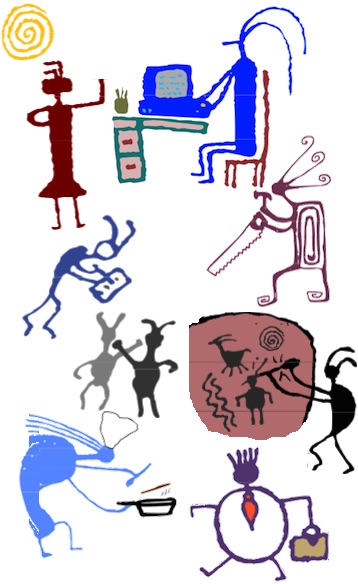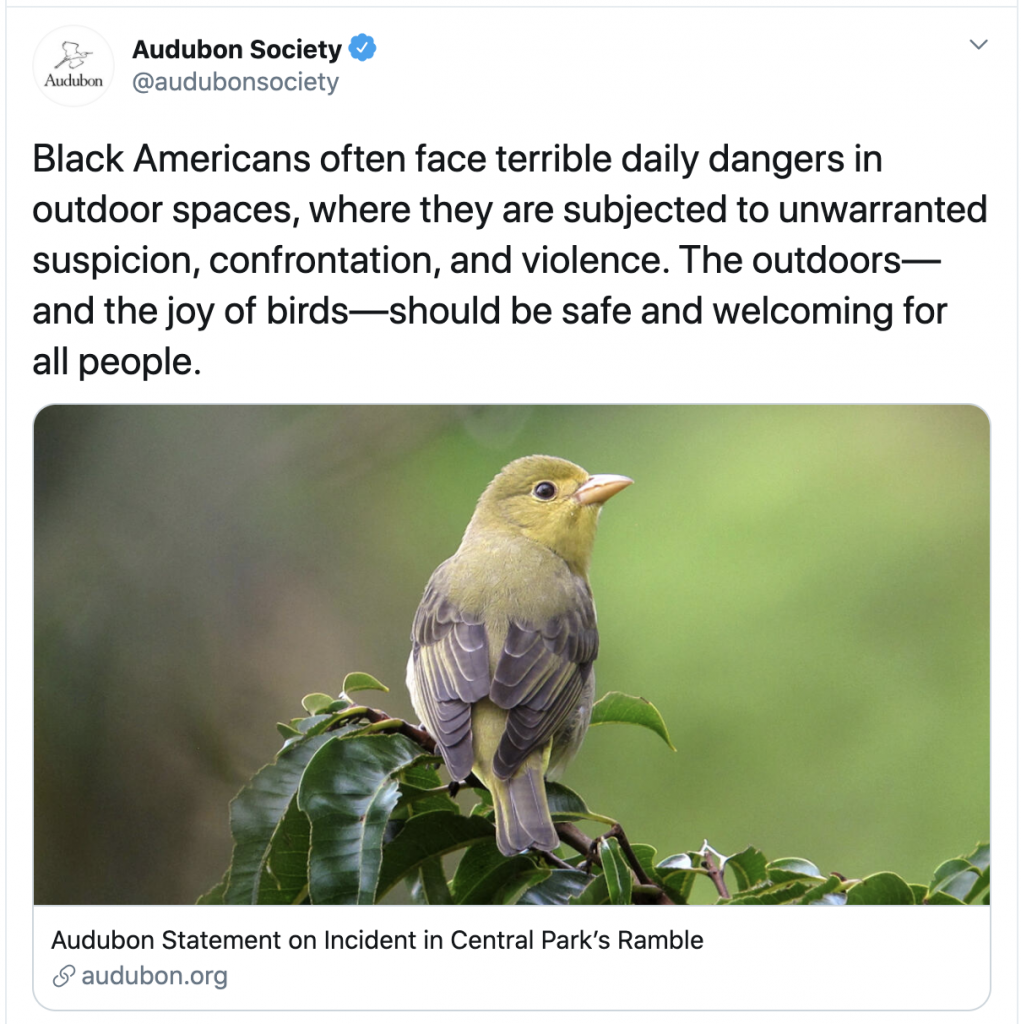
You would have to be living under a rock to have not heard the term systemic racism or institutional racism. It refers to how ideas of white superiority are embedded at a systemic or institutional level all over the USA (and, indeed, all over the world): the standards of beauty promoted in ads and magazines and movies almost always being a white woman. Black Americans incarcerated at greater rates than white Americans, despite there NOT being a difference in the level of crime committed. The combination of deep mistrust of banks and targeting black Americans by for-profit paycheck advance companies and rent-to-own companies that keep a disproportionate number of black Americans crushed under debt. A Harvard study found job candidates were more likely to get an interview when they “whitened” their name. It’s the tendency of people in stores – of a variety of ethnicities – to follow someone who is black or Hispanic around the shop, but not a white woman. It’s a white woman calling the police on a black man in a public park who is bird watching.
I was so impressed with the Audubon Society immediately commenting on that last infamous incident with a series of tweets that began with this one on May 26:

In cooperation with other groups, like Outdoor Afro, they also promoted #BlackBirdersWeek and #BlackInNature on Twitter, featuring wonderful photos of black people and black families enjoying nature and talking about their love of bird watching.
I am sure there are people who said, “The Audubon Society is about birds, not politics, and I don’t like this.” I am so glad the Audubon Society ignored them. If the society lost donors over it, I’m so sorry – I hope they gained far more.
I hope every nonprofit, no matter their focus, no matter the mission, will make a similar public statement, if they haven’t already, about racism and exclusion. This is a cross-cutting issue. Animal shelters, environmental groups, nonprofit theaters, dance companies, museums, historical societies, and on and on – they all need to make a statement, right now, about what is happening and how it relates to their work and their communities.
Which brings me to you. And to me. People focused on recruiting and supporting volunteers, creating assignments for volunteers, consulting about aspects of volunteer engagement, and on and on. What are we doing about systemic racism in nonprofits, particularly volunteer engagement, particularly among managers of volunteers? I am sure that the vast majority of managers of volunteers absolutely abhor deliberate acts of racism and that they want to be more inclusive. And since they don’t engage in deliberate acts of racism, they often shut down at the term “systemic racism.” So, if they can’t say that volunteer engagement at most nonprofits is embedded with systemic racism, can we AT LEAST admit to systemic exclusion?
Take an organization that has decided to exclude anyone as a volunteer who has ever been convicted of a crime, no matter what the crime is, no matter how long ago that crime occurred. That policy automatically excludes a disproportionate number of black Americans as volunteers, because African Americans are incarcerated at more than 5 times the rate of whites. In public schools in particular, the “no convictions” prohibition has the consequence of excluding black people, particularly black men, as volunteers – and schools that have a low number of parental vounteers have students that, overall, don’t do nearly as well academically as in schools where the number is high. Is the policy REALLY about safety, or is it laziness? Let’s just exclude everyone with a conviction rather than to have to think about it too much.
When I read an article about service clubs – nonprofit organizations where members meet regularly to volunteer for charitable works either by direct hands-on efforts or by raising money for other organizations – the list is almost always the same: Lions, Rotary International, Civitan International, Kiwanis, Optimist International, the Junior League, etc. What gets left out? Service clubs specifically representing black residents, Latino residents or Asian residents. Yes, all of the usual clubs are supposed to be open to everyone, and there are some chapters that are wonderfully diverse – but most chapters aren’t diverse, and to focus just on them leaves oh-so-many out – and leaves specific communities out. When I read about an organization’s volunteer recruitment outreach to “communities of faith”, I see a listing of churches with, primarily, white congregations – and all Christian.
When I lived in Austin, Texas, I was charged with increasing the number of people attending a local associations meeting. I emailed groups this association had never contacted before, and at our next meeting, for the first time, attendees represented a variety of ethnicities, neighborhoods, ages and economic backgrounds – but the presentation, on recognizing volunteer contributions, was so white-centric, so middle-class centric, and so women-centric, most of those new attendees never returned.
Those are three examples of systemic racism in volunteer engagement. I don’t think most of the people involved in those three examples are racists, by definition, and had any intention to exclude people of a particular race. But that’s what has happened, and we are perpetuating the practices that perpetuate it.
And then there are organizations that proudly tout their work in digital inclusion, addressing digital redlining, digital literacy, economic factors that keep communities in poverty and out of digital access, many of whom are focused specifically on black communities, but then balk at the idea that their online spaces should be accessible for people with disabilities. That’s systemic exclusion, and it’s something people with disabilities experience regularly from groups that are oh-so-proud of their diversity.
Can systemic racism show up in virtual volunteering engagement? Absolutely. As soon as online volunteer roles cross into the realm of warranting the knowing full names, hearing voices, seeing the faces of volunteers, implicit bias can creep into how those volunteers are (or are not) engaged.
I have tried to have conversations about diversity over the years at organizations where I’ve worked, in my workshops and in various consultancies. It is, by far, the most contentious topic I try to address as a consultant, and not just regarding race: I still get a shiver down my spine when I think of the angry, hostile people that made up the majority of an audience at a Corporation for National Service conference where I talked about recruiting the “new” seniors – Baby Boomers – in SeniorCorps programs. I get a bit of that hostility, though not nearly as overt, when I talk to groups about how to recruit specifically to increase diversity among volunteers. It’s not easy and I know I’ve lost some consulting gigs because I have asked some tough questions, but I’m going to keep doing so, of others – and myself.
I’m on an ongoing journey to look for ways I exclude without intending to, in my consulting, in my volunteer engagement, in my communications strategies, in my language, and on and on. I would like for you to do so as well.
- Why & how to make volunteering as accessible as possible
- Volunteering to build community cohesion
- Welcoming immigrants as volunteers at your organization
- Making certain volunteers feel unwelcomed because of your language
- Do you welcome people with your language?
- The growing youth & loneliness crisis (& lack of empathy crisis) – could volunteer engagement help?
- Volunteer management is community engagement

Thank you, Jayne. The articles and books on volunteerism seem to be wholly coming from a white middle-class experience, and then they stick in a chapter on recruiting people of color as volunteers. If they even do that.
Jan, I’m thrilled that you replied. Oh, you are exactly right: that last bit right at the end of a book or workshop about recruiting for diversity, including people with disabilities… ARGH!
Pingback: Systemic Exclusion in Volunteer Engagement - London and Area Association for Volunteer Administration